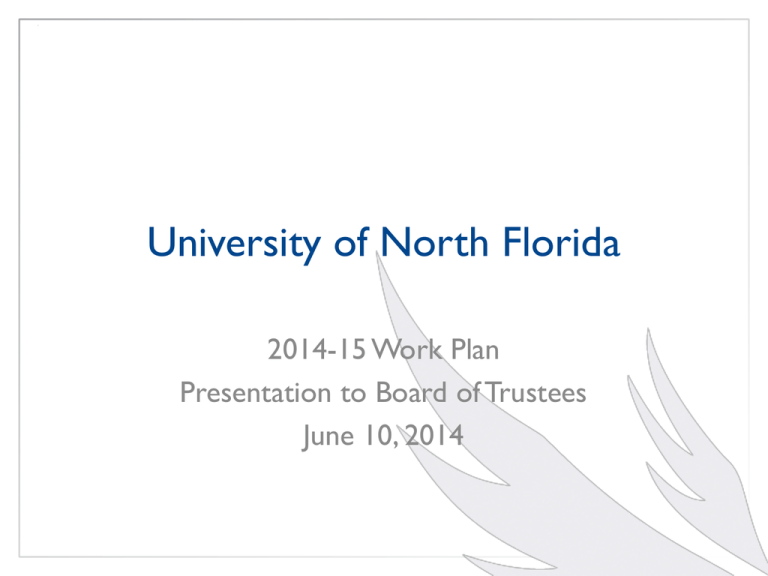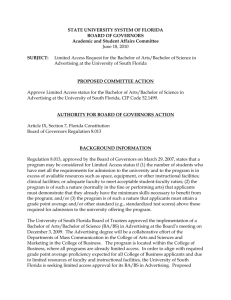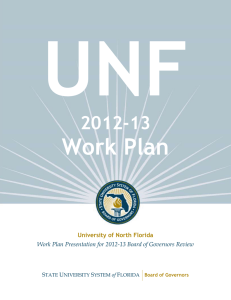Provost Traynham's Presentation
advertisement

University of North Florida 2014-15 Work Plan Presentation to Board of Trustees June 10, 2014 Mission Statement The University of North Florida fosters the intellectual and cultural growth and civic awareness of its students, preparing them to make significant contributions to their communities in the region and beyond. Vision Statement The University of North Florida aspires to be a preeminent public institution of higher learning that will serve the North Florida region at a level of national quality. BOG Required Reports The State University System of Florida has developed three tools that aid in guiding the System’s future. • The Board of Governors’ new Strategic Plan 2012-2025 is driven by goals and associated metrics that stake out where the System is headed; • The Board’s Annual Accountability Report provides yearly tracking for how the System is progressing toward its goals; • Institutional Work Plans connect the two and create an opportunity for greater dialogue relative to how each institution contributes to the System’s overall vision. Statement of Strategy UNF is a regional university dedicated to providing intellectual, cultural, and civic capital for the betterment of Northeast Florida and indeed the entire State. Specifically, the following features characterize UNF’s market: • A diverse metropolitan population and a diverse student body. • A complex economy whose main drivers are the health care industry; shipping, trade, financial services and logistics, and a large technologyintensive corporate sector. • • A unique physical environment • A strong relationship between the university and its many public and private partners • A complementary relationship with the local state college UNF has developed a number of strategies for addressing the needs of its market now and in the future EXPANSION ENHANCEMENT COLLABORATION Key Initiatives and Investment (within 3 years) 1. Enriched Undergraduate Learning. A high-quality undergraduate educational experience, grounded in a liberal arts core, remains the central institutional priority at UNF. Some notable initiatives: Transformational Learning Opportunity (TLO) scholarship program. Initiatives to improve student performance in key gateway courses, particularly in the STEM disciplines. Revision of the General Education program. Continued development of a Freshman Year Experience program. Adoption of a robust data analytics program, designed by the Educational Advisory Board, to identify at-risk students and facilitate more effective interventions. Key Initiatives and Investment (within 3 years) 2. Programs of excellence and relevance. We continue to focus on existing program strengths that correspond to regional economic activity and/or environmental distinction : health and biomedical science, commerce, and coastal science and engineering. Key Initiatives and Investment (within 3 years) 3.Distance Learning. UNF continues to embrace opportunities made available through new technologies to complement its traditional course offerings by increasing its Distance Learning offerings Planned Enrollment Growth FALL 2013 ACTUAL FALL 2014 GOAL FALL 2015 GOAL FALL 2016 GOAL UNDERGRADUATE 14,279 14,308 14,380 14,451 GRADUATE 1,729 1,767 1,776 1,785 NOT-DEGREE SEEKING 250 268 271 273 MEDICAL N/A N/A N/A N/A 16,258 16,343 16,426 16,510 HEADCOUNT TOTAL Distance Learning* as a Percentage of Total Enrollment FULL-TIME EQUIVALENT (FTE) UNDERGRADUATE GRADUATE TOTAL 2012-13 2014-15 2015-16 2016-17 8.3% 11.2% 13.9% 17.3% 12.7% 14.3% 16.6% 19.1% 8.7% 11.5% 14.2% 17.4% New Programs For Consideration by University in AY 2014-15 PROGRAM TITLES AREA OF STRATEGIC EMPHASIS # OF OTHER UNIVERSITIES WITH SAME PROGRAM OFFERED ONLINE FGCU, UCF, USF, UWF Hybrid FAMU, FSU, UF, USF, UWF No FIU, FSU, UF No BACHELOR'S PROGRAMS B.S. in Medical Laboratory Sciences Critical Needs: Health B.S. in Coastal Environmental Science STEM MASTER'S PROGRAMS M.A. in International Affairs Economic Development: Globalization M.S. in Civil Engineering: Coastal and Port Engineering STEM DOCTORAL PROGRAMS Hybrid Performance Based Funding METRICS Percent of Bachelor’s Graduates Employed Full-time in Florida or Continuing their Education in the U.S. One Year After Graduation Median Wages of Bachelor’s Graduates Employed Full-time in Florida One-Year After Graduation Average Cost per Bachelor’s Degree [Instructional Costs to the University] FTIC 6 year Graduation Rate [Includes full- and part-time students] Academic Progress Rate [FTIC 2 year Retention Rate with GPA>2 ] University Access Rate [Percent of Fall Undergraduates with a Pell grant] Bachelor’s Degrees Awarded Within Programs of Strategic Emphasis Graduate Degrees Awarded Within Programs of Strategic Emphasis Board of Governors Choice Metric Percent of Bachelor’s Degrees Without Excess Hours Board of Trustees Choice Metric Percent of Course Sections Offered via Distance and Blended Learning 2012-13 2013-14 2014-15 2015-16 2016-17 ACTUAL GOALS GOALS GOALS GOALS 69% 71% 73% 74% 75% $34,200 $34,681 $35,169 $35,664 $36,166 $29,350 $28,945 $28,546 $28,152 $27,764 49% 49% 50% 51% 52% 76% 78% 79% 80% 81% 36% 36% 37% 37% 38% 45% 45% 46% 47% 48% 51% 51% 53% 55% 57% 71% 72% 73% 74% 75% 9% 11% 13% 15% 17% Other Key Performance Indicators 2012-13 ACTUAL 2013-14 ESTIMATE 2014-15 GOALS 2015-16 GOALS 2016-17 GOALS TIME TO DEGREE 4.9 4.8 4.7 4.6 4.5 AA TRANSFER GRADUATION RATES (4 YEAR) 69% 69% 70% 71% 72% RESEARCH OR INSTITUTION-SPECIFIC 2012-13 ACTUAL 2013-14 ESTIMATE 2014-15 GOALS 2015-16 GOALS 2016-17 GOALS Freshmen in top 10% of graduating high school class 24% 26% 28% 29% 30% 9% 11% 13% 15% 17% PREEMINENT* 2014 ACTUAL 2015 GOALS 2016 GOALS 2017 GOALS 2018 GOALS NUMBER OF METRICS ABOVE BENCHMARK [out of 12] X X X X X COMMON TO ALL Percent course sections offered via DL or blended learning






